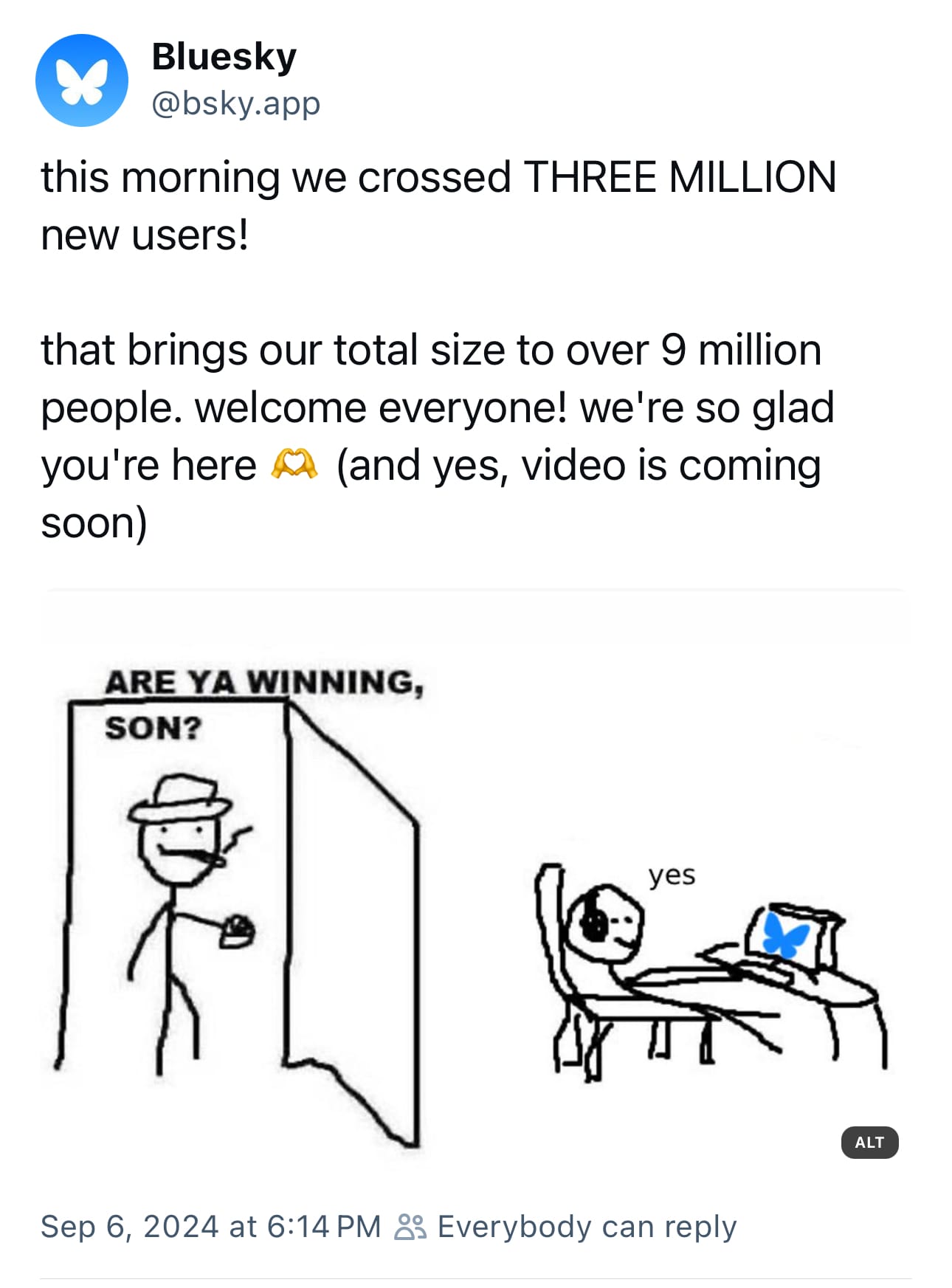Will an official Xodus in Brazil lead to bluer skies for a more open social Web everywhere?

Good afternoon from Washington, where fall has come early. I promise not to use too much pumpkin spice in this newsletter.
Alex Howard here, with another civic text after I took some offline time to unwire. Many thanks to everyone who has subscribed so far! Please share these newsletters and recommend them, if you find them useful or insightful and consider upgrading to a paid membership if you can. I will need much more support to make this work sustain: every person helps.
While Americans celebrated Labor Day Weekend a week ago, Brazilians were focused on an unprecedented clash between their elected government and a tech company born in California and operated by Elon Musk devolved, leading to the platform formerly known as Twitter being blocked by a judicial order.
While I wasn’t sure if this moment would happen first in Europe or another nation, I’ve been expecting something like it since Musk bought Twitter and renamed it X — and the. brought back hundreds of thousands of accounts that had been suspended or banned under various policies former leadership had put in place and then tried to enforce, with varying effect.
As I told CNBC back in December, Twitter’s ban on promotion of selected social media services and restriction of links was not a good policy:
Suspensions of journalists reporting on moderation decisions was similarly horrific, chilling journalism on the platform and serving notice that new management was willing to change policy and ban journalists.
Successful companies should compete in the markets for attention, advertising, & information online by making & deploying robust, compelling products and services, not suddenly imposing draconian limits to freedom of expression and linking to other services online, which key anti-competitive behavior & anti-consumer behavior.
After a massive backlash, Elon Musk apologized — a rarity — Twitter deleted tweets and a webpage that outlined the regressive policy, and Musk created a poll asking if he should step down. (He demoted himself to CTO and hired Linda Yaccharino, but no one thinks she’s ultimately in charge.)
As I said then, the rollercoaster ride to and from Hades was far from over:
If explicitly anti-press, anti-government, & transphobic rhetoric, suspensions of the press, & extraordinary restrictions on both freedom of expression & freedom to link continue, more institutions will be forced off the sidelines this week to suspend participation, shift to listening mode, or leave outright Twitter.
As with every platform where we spent time, attention, or money, online or off, individuals, corporations, news media, & democratic governments all must reassess what corporate behavior, norms, & policies they are willing to endorse through continued participation, much less support through paid promotion or subscriptions.
Since 2006, Twitter has acted as an information utility, along with a news browser, organizing tool, office watercooler, social network, & global platform for protests, campaigns, & lies that fueled an insurrection.
It’s always been driven and shaped by the action of humans on it, not just the product and policy and feature decisions of its operators. The emergent behavior we see in reaction to the past week of changes will shape what Twitter will be in 2023, & to whom.
I’d say that‘s decent predictive validity, right? In the interim, Musk’s increasingly partisan behavior, overtly racist, misogynistic rhetoric, and erratic governance of the platform have indeed led to an exodus of people and advertisers over time, ebbing and flowing after different events. Ezra Klein has called these “exodus shocks,” which is apt.
These shocks have led people to kick the tires of alternatives, from Mastodon to Post.news (RIP) to Bluesky to Threads to LinkedIn — more on that later.
But, despite Musk’s antics and enshittification of the service, the beating heart and thus center of gravity for real-time events around politics, government, sports, and media has continued to be the platform formerly known as Twitter. This has not been a happy couple of years for folks like me, as a result.
Of the options, Bluesky looks, feels, and works the most like Twitter did, by design, with a growing number of improvements. (For more about underlying difference focused on an open protocol instead of a closed platform, read Mike Masnick’s seminal paper. The ease of use is one reason that shock exoduses from the United Kingdom and Brazil flowed there.

As a result, there are now 9 million active users on Bluesky. Small potatoes, in a world of platforms with a billion folks, but small seeds can grow.
The platform formerly known as Twitter still matters, but “what‘s happening” there is part of a larger problem downstream of the void in entrepreneurial policymaking around the open Internet in Washington.
It would be WILD if Brazil banning X leads Brazilian government to adopt Bluesky, much less a shift to embracing open protocols in a global fediverse, which in turns leads to other democracies doing so.
This White House could have established social beachheads & adopted strategic silence on Twitter/X at any point over the last two years, as Musk waxed anti-democratic & overtly partisan.
The next administration should mitigate growing risks associated with key points of control that Musk has gained over satellite Internet access on Starlink, global communications on X, and space travel on SpaceX by ensuring the United States government has alternatives.
Imagine if the United States provided open internet access to nations where authoritarian governments shut it off, from Pakistan to Cuba to Iran.
I wish I were more optimistic: the European Union ended their decentralized social media pilot this summer, and the United States also decided not to move forward with a proposed approach to identity-proofing officials online. If Trump wins re-election, all bets are off for policy in this arena, as in other aspects of civic technology and open governance.
I don’t expect any questions in tomorrow’s presidential debate about any of this, though it’s possible we might hear one on foreign covert influence and online influence, given recent disclosures by the Justice Department regarding secret Russian support for extremely online nationalists in the USA.
In an alternate universe, we might hear a discussion of how this in part reflects a failure of enforcement of the Foreign Agents Registration Act, or why it is also the outcome of deliberate dysfunction at the Federal Election Commission.
We might hear the candidates propose that the FEC to promulgate regulations on disclosures & disclaimers for influencers who have been paid to endorse candidates, campaigns or issues, as the FTC requires online influencers who are paid to endorse products or services to do.
But in the timeline we are on, we’re likely to hear a former president deny that Russia is trying to get him re-elected, much less explain to his fellow Americans why he and his campaign was willing to accept that help.
As always, thank you for reading and subscribing. More anon.



